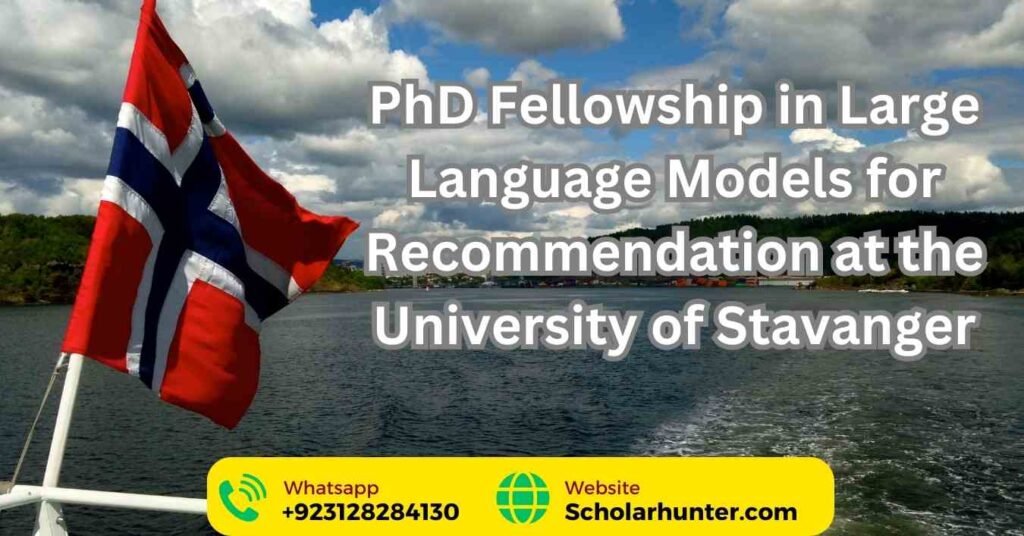Short Detail of :
Description of Scholarship:
announced by for to study in . The scholarship allows level programm(s) in the field(s) of taught at . The last date of applying for this scholarship is and scholarship provide to successful candidates.
The provide a golden chance to to complete their studies in the field(s) of at on scholarship.
The University of Stavanger (UiS) is inviting applications for a prestigious PhD Fellowship in Large Language Models for Recommendation at the Faculty of Science and Technology. This fellowship presents an exciting opportunity to delve into advanced research areas like personalized recommendation systems by leveraging cutting-edge natural language processing (NLP) techniques, specifically large language models (LLMs). If you’re passionate about pushing the boundaries of AI, this could be the perfect path for you.
Why Study at the University of Stavanger?
Located in the heart of Norway, the University of Stavanger (UiS) is one of the nation’s most forward-thinking research institutions, consistently leading innovation and collaboration with both industry and academia. Since its establishment in 2005, UiS has become well-known for its multidisciplinary research, spanning various fields including engineering, science, social sciences, and humanities. Its world-class facilities and dynamic academic community make it a top choice for those seeking a research-intensive environment.
The Faculty of Science and Technology, particularly the Department of Electrical Engineering and Computer Science, has been at the forefront of research in artificial intelligence (AI), natural language processing (NLP), and information retrieval systems. This PhD program will directly address these fields, offering a unique chance for researchers to contribute to personalized recommendation systems, an area with wide-ranging applications, from e-commerce to content streaming services.
Large Language Models for Recommendation Systems
The PhD Fellowship in Large Language Models for Recommendation will concentrate on exploring how large language models (LLMs) can revolutionize personalized recommendation systems. These models, built on deep learning and vast amounts of text data, have shown unprecedented success in understanding and generating human-like language. By incorporating NLP techniques into recommendation algorithms, the goal is to create systems that offer far more personalized, accurate, and user-friendly suggestions.
Why Focus on Large Language Models?
The rise of LLMs, such as GPT and BERT, has transformed the landscape of AI and NLP. Their ability to process large amounts of data, understand context, and generate coherent text makes them ideal for applications in recommendation systems. Traditional recommendation algorithms often rely on user behavior and interaction data; however, by integrating LLMs, these systems can go beyond click patterns and delve into semantic understanding of user preferences, enabling much richer, contextually-aware recommendations.
Eligibility Criteria for the PhD Fellowship
To apply for the PhD Fellowship at UiS, candidates must meet the following eligibility requirements:
- Educational Background: Applicants must hold a five-year master’s degree in computer science or a closely related field, preferably earned in recent years.
- Specialization: While all computer science graduates are welcome, priority will be given to those who have specialized in fields such as information retrieval, natural language processing, or recommender systems.
- Academic Excellence: A minimum B grade is required for both the master’s thesis and the overall weighted average of the degree. This ensures that applicants have demonstrated academic rigor in their studies.
- Current Master’s Students: Those completing their master’s degrees in fall 2024 are also eligible to apply, provided they submit their final grades by the end of the year.
- Grading Conversion: A confirmed conversion scale for grades is mandatory for international applicants, particularly for institutions using grading systems that differ from the Norwegian grading system.
Application Deadline and Process
- Application Deadline: The last date to apply for this PhD fellowship is 31st October 2024.
- Application Portal: All applications should be submitted via the University of Stavanger’s official online portal.
- Required Documents: Applicants need to provide:
- Academic transcripts
- CV
- Cover letter
- Research proposal
- Confirmed conversion scale (for non-Norwegian systems)
Early submission is encouraged to ensure proper evaluation of all documents and eligibility.
Benefits of the PhD Fellowship
Selected candidates will be appointed for a three-year term, during which they will:
- Collaborate with Leading Experts: As a PhD fellow, you’ll work closely with leading researchers in AI, NLP, and information retrieval. This will offer opportunities to engage with experts both in academia and industry.
- Cutting-Edge Research: You’ll gain experience in large-scale AI research, particularly focusing on LLMs for recommendation systems, contributing to advancements in personalized technology.
- Networking Opportunities: The fellowship encourages collaboration with global research communities and top industry players, allowing fellows to establish valuable connections.
- Competitive Salary: The fellowship provides a gross annual salary of NOK 532,200, ensuring financial stability during the research period.
- Access to State-of-the-Art Facilities: UiS offers access to world-class laboratories, computational resources, and AI infrastructures, vital for conducting high-impact research.
This PhD Fellowship in Large Language Models for Recommendation will provide you with the tools, expertise, and environment necessary to make groundbreaking contributions to AI and recommender systems.
Why Pursue a PhD in Large Language Models for Recommendation?
Pursuing a PhD in LLMs for recommendation systems not only contributes to academic knowledge but also has numerous practical applications. These include:
- E-Commerce: Personalized shopping recommendations powered by AI have become a key differentiator for online retailers.
- Content Streaming: Platforms like Netflix and Spotify are increasingly relying on sophisticated algorithms to deliver customized content, enhancing user satisfaction.
- Healthcare: In the healthcare industry, recommendation systems can assist in tailoring treatments, recommending personalized healthcare plans, or suggesting research papers relevant to a doctor’s area of expertise.
APPLY NOW
Incorporating NLP techniques into recommendation systems allows the algorithm to understand the semantic relationships between user inputs, content metadata, and feedback. By applying LLMs, we can achieve more nuanced and context-aware recommendations. This has far-reaching implications, from improving user experience to providing business insights based on user preferences.
FAQs
1. What is the focus of this PhD Fellowship?
The focus of the fellowship is to explore how Large Language Models (LLMs) can be applied to personalized recommendation systems by leveraging NLP techniques.
2. What are the eligibility requirements?
Applicants need a five-year master’s degree in computer science or a related field, with at least a B grade in their thesis and overall coursework.
3. How can I apply?
Applications should be submitted via the University of Stavanger’s online portal before 31st October 2024.










